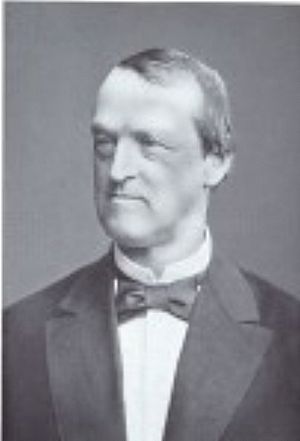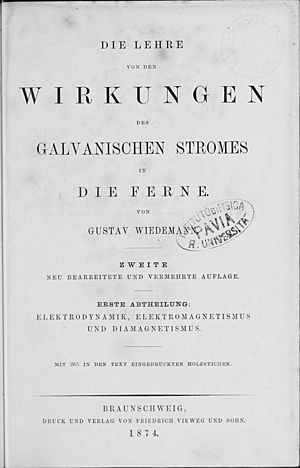Gustav Heinrich Wiedemann facts for kids
Quick facts for kids
Gustav Heinrich Wiedemann
|
|
|---|---|
 |
|
| Born |
Gustav Heinrich Wiedemann
2 October 1826 |
| Died | 24 March 1899 (aged 72) |
| Known for | Wiedemann effect Wiedemann–Franz law |
| Awards | ForMemRS (1884) |
| Scientific career | |
| Fields | Physics |
| Institutions | Karlsruhe Institute of Technology Leipzig University University of Basel Technical University of Braunschweig |
| Notable students | August Hagenbach |
Gustav Heinrich Wiedemann (October 2, 1826 – March 24, 1899) was an important German physicist and science writer. He made big discoveries about how electricity and heat work. He also helped publish many scientific papers.
Contents
Gustav Wiedemann's Early Life and Education
Gustav Wiedemann was born in Berlin, Germany. His father passed away when Gustav was very young. After his mother died in 1842, he lived with his grandparents.
He went to a private school and then a Gymnasium. In 1844, he started studying at the University of Berlin. Three years later, he earned his doctor's degree. His main goal was to study physics. However, he believed that learning chemistry first was very important.
Friendships and Early Societies
In Berlin, Gustav Wiedemann met another famous scientist, Hermann von Helmholtz. They became friends through Heinrich Gustav Magnus. Wiedemann was also one of the people who started the Berlin Physical Society. This group helped scientists share their ideas.
Wiedemann's University Career and Discoveries
In 1854, Wiedemann moved to Basel in Switzerland. There, he became a Professor of Physics. Nine years later, he moved to Braunschweig. In 1866, he went to Karlsruhe.
In 1871, he became a professor of physical chemistry at the Leipzig University. His early chemistry studies helped him in this role. Later, in 1887, he became a physics professor, which he enjoyed even more.
With Rudolph Franz, Wiedemann developed the Wiedemann–Franz law in 1853. This law helps explain how heat and electricity move through metals. It was a very important discovery in physics.
Notable Students and Later Years
One of his students in Leipzig was August Hagenbach. Gustav Wiedemann passed away in Leipzig on March 24, 1899.
Gustav Wiedemann's Important Scientific Writings
Gustav Wiedemann is widely known for his work in publishing scientific papers. In 1877, he became the editor of the Annalen der Physik und Chemie. This was a very important science magazine. People often called it Wied. Ann. because of his work.
He also wrote a huge book called Die Lehre van der Elektricitat. This book was first named Lehre von Galvanismus und Elektromagnetismus. It was known for being very accurate and complete. He published the first edition in 1861. The fourth, updated edition was finished just before he died.
Wiedemann's Key Scientific Research
Gustav Wiedemann did a lot of important original research. His measurements of how well different metals conduct heat were trusted by physicists for a long time. He also measured the ohm, a unit of electrical resistance. He did this using mercury, showing great skill in precise experiments.
Discoveries in Magnetism
He also did many studies on magnetism. These studies led to the discovery of interesting things. Some of his findings were even rediscovered by other scientists later.
- He looked at how stretching or squeezing metals affected their magnetic properties.
- He studied the link between the chemical makeup of materials and their magnetic properties.
- He found a strange similarity between the rules of twisting (called torsion) and the rules of magnetism. This discovery is known as the Wiedemann effect.
Wiedemann also studied how electricity moves through liquids (called electrolytes). He also looked at a process called electrical endosmosis.
Gustav Wiedemann's Family Life
In 1851, Gustav Wiedemann married Clara Mitscherlich.
Their oldest son was Eilhard Ernst Gustav. He was born in Berlin on August 1, 1852. In 1886, he became a physics professor at Erlangen. Their younger son, Alfred, was born in Berlin on July 18, 1856. He became a professor of Egyptology (the study of ancient Egypt) at Bonn in 1892.
See also
 In Spanish: Gustav Heinrich Wiedemann para niños
In Spanish: Gustav Heinrich Wiedemann para niños
 | Percy Lavon Julian |
 | Katherine Johnson |
 | George Washington Carver |
 | Annie Easley |


